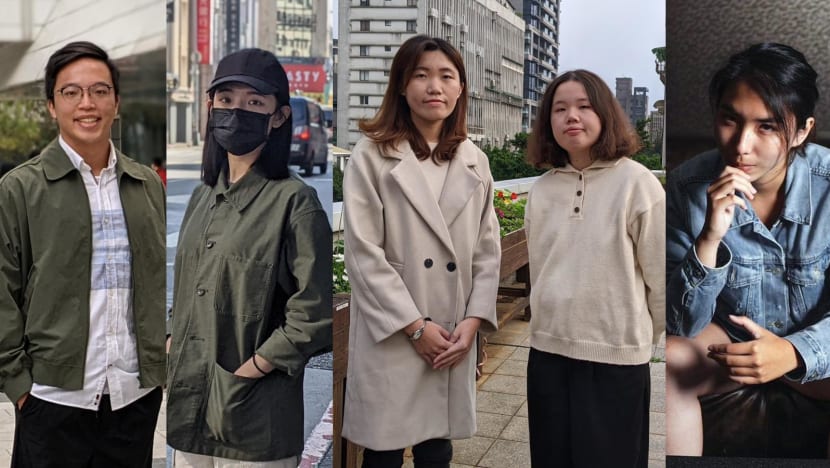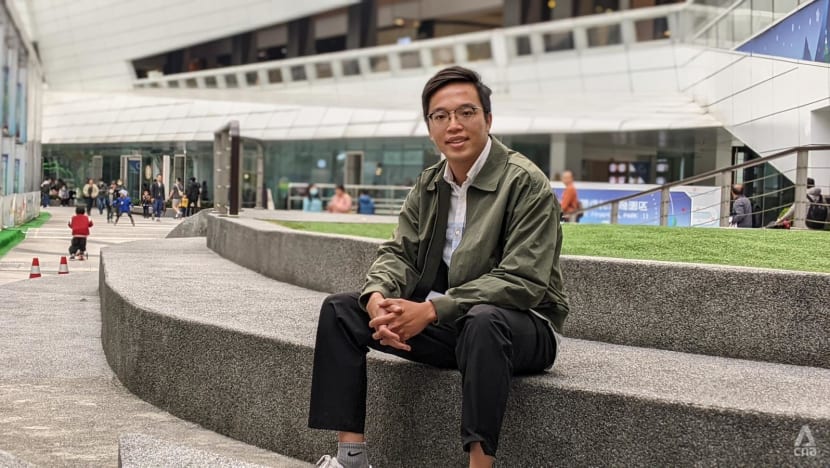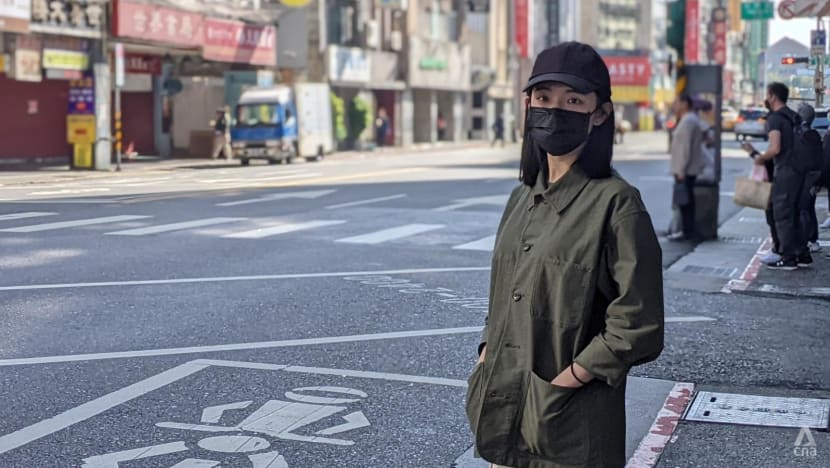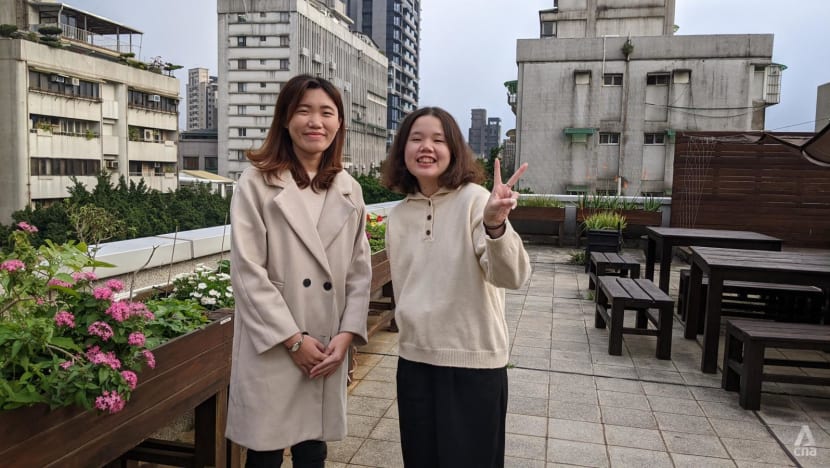Taiwan Votes 2024: What Taiwanese youth really want from this presidential election and beyond
Some cherish Taiwan’s sense of freedom, while others worry about their children’s future and the cost of living. What matters most to the island’s youths and how will they vote in the Jan 13 elections?

Youths aged 20 to 34 make up about one-fifth of Taiwan's population. (Photos: CNA/Neo Chai Chin; Amaza Kuo)

This audio is generated by an AI tool.
TAIPEI: Cross-strait relations, housing justice, costs of living, road safety, mental health, and Taiwanese identity.
If there’s one thing to know about Taiwan’s youths, it’s that they care about many issues, like those listed above.
In the lead-up to Taiwan’s presidential and legislative elections on Jan 13, political parties and candidates have campaigned hard for the youth vote.
They have made policy proposals aimed at making child rearing and housing more affordable, for instance, and engaged youths in dialogues at universities and other places.
Youths aged between 20 (Taiwan’s legal voting age) and 34 make up about one-fifth of the island’s 23.6 million population, but are seen as an important group.
Youths’ turnout at elections is typically lower than the rest of the population, but they turned up in force in 2020 with a showing of over 70 per cent. This helped President Tsai Ing-wen win a second term with a record total of 8.17 million votes – the highest since direct presidential elections began in 1996.
Mr Alvin Chang, managing director of the non-governmental organisation Taiwan Youth Association for Democracy, said the high youth turnout in 2020 was partly a response to events in Hong Kong that year – China’s sweeping national security law in response to anti-government protests there – and may not be repeated in 2024.
“Nowadays it’s become a trend (for candidates) to tell not only youngsters, but society, that ‘yes, I care about youths’ and come up with different youth policies”, he told CNA.
Politicians typically cite high rents or low salaries as difficulties faced by youths, said Mr Chang, 26.
But youths also care about environmental protection, energy, marriage and gender equality as well as lowering the legal voting age, among other topics, he said.
Whoever becomes Taiwan’s next president will need to communicate more with youths and the rest of the electorate, some young voters told CNA. Communication is crucial in the era of distrust and disinformation, Mr Chang added.
Here are what some youths told CNA about their lives, concerns and pet causes, and how these will influence their votes at the Jan 13 presidential election:
‘HOUSING PRICES ARE INSANE’
Henry Chien, 29, project manager at a company that makes rugged laptops
After getting his Master of Business Administration from the National Chengchi University five years ago, Mr Henry Chien joined a Taiwanese multinational tech company.

He wanted to do overseas sales in order to practise his English, and received training from the company before being posted to Jakarta for two years. He took the opportunity to travel around Indonesia and Southeast Asia.
As he turns 30 this month, his mindset has shifted a little, he said. “Before I was 27, I didn’t think I would buy a house, marry or raise a child,” said Mr Chien, who is now a project manager at a different company that makes rugged laptops.
But after turning 28, his girlfriend and family started asking if he would marry and buy a house.
This was when Mr Chien, who lives in New Taipei City, looked up housing prices and found them to be “insane”. The average annual salary of his peers is about NTD$1 million (US$32,100), and a 66 sqm home in Taipei would cost at least NTD$15 million, he said.
“You cannot eat or drink for 15 years (to be able to afford the house). And what you would buy is (an) old, sad (place). People who live there will be sick – I’m not kidding!” he said. A newer apartment in Taipei that is below 20 years old would cost NTD$20 million or more, he said.
Mr Chien has discussed options with his girlfriend, who lives in Taipei. “If we want a new house, we must sacrifice some convenience. We need to drive or take a bus,” he said.
Mr Chien is looking to buy a home in the next five years, but is realistic about what politicians can do about housing costs. “No party can lower housing prices”, he said, but in his opinion, two parties – the Taiwan People's Party (TPP) and Democratic Progressive Party (DPP) – are trying to keep prices under control.
For this election, he is also trying to expose his parents to new media platforms, and a “new voice” whom he supports: presidential candidate Ko Wen-je of the TPP, which was formed only in 2019.
Dr Ko has been notably successful with younger voters through his direct manner of speaking and his social media content – more so, youths said, than the two traditional parties DPP and Kuomintang (KMT).
There are about 15 to 20 per cent of voters who do not identify with the DPP or KMT, explained political science assistant professor Chen Fang-yu of Taiwan’s Soochow University.
“There’s fatigue because for the past two decades, DPP and KMT have dominated party politics and they fight each other,” he said. “Ko just utilises this fatigue and claims he’s a new hope, a new alternative.”
“When I’m having dinner with my parents, I’ll say let’s not watch (traditional TV channels),” said Mr Chien. He would select a YouTube channel with satire comedies, such as STR Network, to “let them know… what information the younger generation is receiving”.
Mr Chien said he has had some success getting his mother to consider voting for a different party this time. Meanwhile, his father has learnt “how to use YouTube to select a channel (to watch)”.
‘I WONDER ABOUT MY CHILD’S LIFE AND FUTURE’
Amaza Kuo, 23, mum-to-be and chief executive of an audio store
Having children, housing and domestic issues are Ms Kuo’s chief concerns. “I wonder about my child’s life and future when it comes to housing,” she said.
She earns about NTD$40,000 to $50,000 a month, which is “considered not bad” for a 23-year-old, she said. She and her partner were able to get public housing and rent a roughly 99-square-metre home for over NTD$20,000 a month after rental assistance.

They also got a parking lot which Ms Kuo said they could, in turn, rent out to others in the same development. There are people willing to pay NTD$3,000 to $4,000 a month for it, she said. The implication of such a move isn’t lost on her:
“I thought, wow, am I speculating on land now? But the cost of living is so high, you’re forced to do these things if you want to lower your costs.”
While her boss is pro-family and has said Ms Kuo can take her child – who is due in May – to work in future, Ms Kuo reckoned the majority of bosses would not allow it. There should be more public childcare services, she said.
She also welcomes the prospect of living overseas. “My boss has been thinking of expanding overseas and I’ve said that if the business expands to Japan, I’ll go there,” she said. Even though friends have cautioned that life in Japan may not be cheaper or less stressful, “at least Japan would be a change”.
Change is also what she will be voting for in the coming elections – Ms Kuo said her chosen candidate, Dr Ko, is humorous and able to make complex issues understandable.
‘TAIWAN’S DEMOCRACY IS FRAGILE’
Ju-jie, 28, public relations consultant
To public relations consultant Ju-jie, Taiwan-China relations is the most important issue in the presidential election.
Ju-jie, who asked not to reveal her surname, grew up in a “Deep Green” (pro-DPP) family in Kaohsiung. In primary school, she would tag along when her parents drove four to five hours’ north to Taipei to vote, before their residence was registered to Kaohsiung.

“Taiwan’s democracy is very fragile and something we need to be careful about,” she said. The population should be aware not only of the threat of physical war, but cognitive and information warfare, she added.
China claims Taiwan as its territory and does not rule out the use of force to unify it with the mainland. Taiwan is also said to be the top target for foreign governments in the spread of false information, but is known for its civil society groups that do fact-checking and combat disinformation.
It is important to improve Taiwanese soldiers’ sense of national honour and increase Taiwan’s defence budget, said Ju-jie, who also commended the extension of military service to a year, and the island’s indigenous submarine programme.
According to his research, Asst Prof Chen said younger voters are less willing to defend Taiwan in the instance of a Chinese attack.
“We found that if we are confident in our army, then we are more willing to self-defend. But the younger generation is less likely to have confidence in the army,” said Asst Prof Chen.
In other areas of her life, Ju-jie said she has been lucky. She rents a place with a flatmate in Taipei and pays about NTD$12,000 a month.
“On the rental front, I have been quite fortunate because the landlords I’ve met are civil servants and abide by the law; they are less likely to mess around,” she said. “They would not stop me from applying for rental subsidies or charge me (a higher price) for electricity,” she added, referring to some common practices in the rental black market in Taiwan.
On the presidential candidates, Ju-jie felt Dr Ko to be more of a social media star than a politician, and noted his cross-strait stance is unclear.
The KMT pair of Mr Hou Yu-ih and his vice-presidential pick, Mr Jaw Shaw-kong, are a traditional duo who present a united front, she said. Mr Hou also uses his law enforcement background to project stability, she added.
The past eight years under the DPP’s Tsai Ing-wen have presented an opportunity to view “old issues through new lens”, she said.
For instance, President Tsai’s New Southbound Policy has shown how Taiwan can expand trade and cooperation with countries besides China, and the party should communicate its policies better to let young voters know what it has accomplished, said Ju-jie, who leans towards the party.
“I feel Taiwan is a comfortable environment and I do not think about leaving. I can earn enough for myself and also contribute to my family,” she said. “I feel a sense of freedom living here.”
Related:
MAKE ROADS SAFER, DO MORE FOR MENTAL HEALTH
Alice Yang, 21, and Li You-shuang, 21, university students
Unlike Ju-jie, fourth-year radio and television student Li You-shuang and some of her friends have not been as lucky when looking for places to rent.
Rentals are higher in Banqiao, where Ms Li’s university is. There are landlords who overcharge for electricity, as well as those who increase rents after their tenants apply for rental subsidies.
“There are landlords who carve up a room, resulting in a very small space. And some places, you wonder if they are even habitable,” she recounted.
While the three presidential candidates have spoken about building more social housing, the government should also pay more attention to the quality of rental properties, said Ms Li.
She and her friends are equally concerned about road safety. Over 3,000 people including 394 pedestrians were killed in traffic accidents in Taiwan in 2022.
“We hope the traffic safety issue is more seen and addressed, such as problems with road markings. Taiwan’s population is quite dense, but the parking system is not comprehensive, so a lot of people stop their motorbikes in pedestrian areas, leaving pedestrians vulnerable,” she said.

As for third-year political science student Alice Yang, 21, getting more youths to prioritise mental health is key.
In recent years, people have become more open and willing to seek help, she said. The government introduced a programme in August 2023 that let Taiwanese youths aged 15 to 30 access three free psychological consultations, which was met with strong demand.
The Taiwan Youth Association for Democracy, where Ms Yang is a supervisor, is advocating for more consultations, with youths forking out a small amount of money.
It is also advocating for mental health leave at universities and high schools, said the association’s managing director Alvin Chang.
Ms Yang, who hails from Taichung, declined to reveal which presidential candidate would get her vote. Ms Li, who is from Chiayi in southwestern Taiwan, will not be returning to vote as she has volunteered to open ballots at a polling station in Banqiao.
“I think this process is very symbolic to Taiwan's democracy,” she said.
Other youths CNA spoke to cited the safeguarding of Taiwanese identity and the candidates’ stance on nuclear energy as key to how they would vote.
Some also noted that besides TPP’s Dr Ko, DPP’s vice-presidential candidate Hsiao Bi-khim has stood out for her liberal image during her time as a legislator, her ability to communicate with conservative voters, and her performance as Taiwan’s de facto ambassador to the United States.
But youth voters’ turnout in this election is unlikely to surpass the level in 2020 due to the lack of a salient issue, noted Asst Prof Chen. Their turnout could hover between 60 and 65 per cent, he predicted.




















